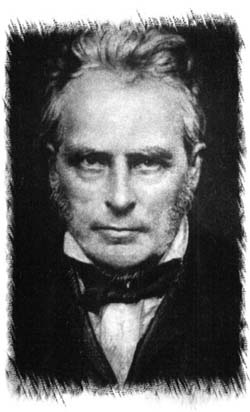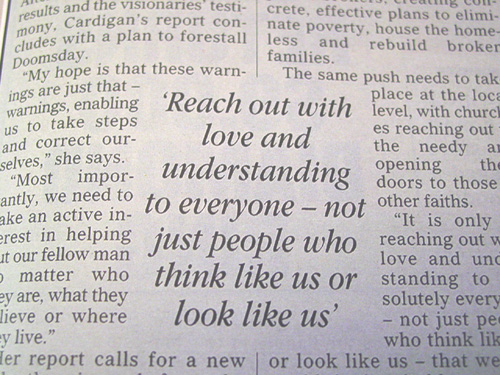|
The Rev. Frank
Logue
The Problem with the Rapture Today’s second reading gives perhaps the clearest passage of scripture on Jesus’ highly anticipated return to Earth. Paul writes that Jesus will come in the clouds and the Dead in Christ will rise first, to then be joined by the rest of the faithful. This passage is usually quoted as a proof text for The Rapture. Encountering this passage from Paul’s Letter to the Christians in Thessalonica then gives me a chance to tell you more about The Rapture.
[project the cover of the
current issue of The Sun with the headline That’s not it. Actually I read Lutheran pastor Barbara Rossing’s book The Rapture Exposed: The Message of Hope in the Book of Revelation[1] [show book cover in PowerPoint]. But it is worth pausing first with the cover story from the current issue of The Sun. Jesus often makes the tabloids and it is almost always with gloom and doom predictions. Far from Good News, Jesus’ face on a tabloid cover usually heralds news of the End of the World with all the attendant natural disasters and violence. The Sun’s cover story is no different claiming that new prophecies reveal that November 9 will be the day of Jesus’ return. Though the article goes on to say that this date might be able to be avoided. We are warned to reach out in love or face the imminent wrath of God. Now compare this supermarket checkout fair
with the book I actually read on the rapture. In her book, “The Rapture Exposed
Most Christian churches and biblical scholars condemn Rapture theology as a distortion of Christian faith with little biblical basis. Critics represent the whole spectrum of churches, from conservative Missouri Synod Lutherans to evangelicals, to Roman Catholics, and liberal Presbyterians. Many evangelical churches and leaders oppose the notion of the Rapture, pointing out that it is a recent and idiosyncratic development in Christian teaching. But institutional criticism is essentially irrelevant. It is through popular televangelists and writings such as Lindsey’s The Late Great Planet Earth and the more recent Left Behind novels that the Rapture storyline has become central to so many Americans’ understanding of the Bible and Christian faith. The idea of The Rapture is so ingrained in most Americans understanding of the Bible that to speak against The Rapture sounds like speaking against God. I was nervous this week when preparing for this sermon, because I know that some things are easier taught than preached as in teaching there is a back and forth, where in a sermon I spend less than 15 minutes with no question and answer. Yet, to know the problems with some rapture theology and not to make you aware of the issues would be to shirk my duty as pastor.
I want to stop and clarify two points:
What I want to do in this brief sermon is to let you know that The Rapture is not a core Christian doctrine as it was not found in the historic creeds of the church, nor was it taught among any Christians until 1830, and only gained broader acceptance after Israel’s statehood in 1948. To help you understand how anyone could read the Bible and not see The Rapture, there are two passages of the Bible I need to explain from another viewpoint. The first and perhaps most important are Jesus own words from the 24th chapter of Matthew: But of that day and hour no one knows, not even the angels of heaven, nor the Son, but the Father alone. For the coming of the Son of Man will be just like the days of Noah. For as in those days before the flood they were eating and drinking, marrying and giving in marriage, until the day that Noah entered the ark, and they did not understand until the flood came and took them all away; so will the coming of the Son of Man be. Then there will be two men in the field; one will be taken and one will be left. Two women will be grinding at the mill; one will be taken and one will be left. Therefore be on the alert, for you do not know which day your Lord is coming. But be sure of this, that if the head of the house had known at what time of the night the thief was coming, he would have been on the alert and would not have allowed his house to be broken into. For this reason you also must be ready; for the Son of Man is coming at an hour when you do not think He will. Simply put, it might be better to be left behind in Jesus’ teaching above. Yes, two people are alongside one another, one disappears and the other remains. Because of the teaching of Darby on The Rapture, where the faithful are taken away, we see this as Jesus’ teaching on The Rapture. But what did Christian’s think in those centuries before Darby. They taught that Jesus said the one’s in the days of Noah who were taken away were the one’s judged as evil. Think of it in terms of Russia in recent history when soldiers would come in the night to arrest someone and their family would never see them again. This is more of the image and it fits the Palestine of Jesus when they were under Roman oppression. The person taken is taken away to judgment. That is the way it was in Noah’s day, according to Jesus, and it could be the way things will be at Jesus’ Second Coming if the one’s who remain, remain with Jesus. The next passage to explain is our text from First Thessalonians that was read this morning. Paul writes, For this we declare to you by the word of the Lord, that we who are alive, who are left until the coming of the Lord, will by no means precede those who have died. For the Lord himself, with a cry of command, with the archangel’s call and with the sound of God’s trumpet, will descend from heaven, and the dead in Christ will rise first. Then we who are alive, who are left, will be caught up in the clouds together with them to meet the Lord in the air; and so we will be with the Lord forever. For this to be a teaching on The Rapture, Jesus needs to switch directions and return to heaven. But Paul never says that. It is also possible that we go to meet Jesus to arrive on earth with him. If this sounds off base, consider that it was once considered good protocol to meet a visiting dignitary on the outskirts of town and escort them in. We still do this in meeting dignitaries at the airport and bringing them into town by limo or motorcade of limousines. The Greek word Paul uses is apantesis, which was the word used in describing this sort of meeting. It is the same word used in our Gospel reading for this morning when the 10 bridesmaids went out to meet the bridegroom so that they could go with him into the wedding banquet. The bridegroom doesn’t switch directions and leave with the bridesmaids, but continues in to the banquet. This same scenario occurs again in the Book of Acts (chapter 28) where apentesis is used to describe Christians from Rome going out to meet Paul. This is what is said in Acts, Thus we came to Rome. And the brethren, when they heard about us, came from there as far as the Market of Appius and Three Inns to meet us; and when Paul saw them, he thanked God and took courage. When we entered Rome, Paul was allowed to stay by himself, with the soldier who was guarding him. We see here that those who met Paul did not go away with him. Paul did not switch directions but continued in to Rome. This is why the church for centuries read our passage from Thessalonians as describing Jesus’ return to earth. Now I need to stop with the direction I have been going. I do not intend to refute The Rapture. It is in fact so ingrained in me from youth that it would be impossible for me, at this point, to do so with confidence. What I do want to do this morning is to let you know that the complex schemes of End Times predictions are dicey at best and the most complex of all is that built on the dispensational teaching of John Darby. I don’t want to say his teaching can’t be true, just that one should guard against making one preacher’s interpretation into the Gospel itself. The reason I point this out, even though I hesitate to do so is that the core of the Gospel is at stake. I said that The Rapture is not a core doctrine of our faith as it was not part of the historic creeds of the church nor was it taught at all until 170 years ago. But those who follow this teaching closely risk abandoning Christian teachings that are central to who we are. First, Jesus taught very clearly that not only did he suffer because he lived out the love God has for others, but his followers would suffer as well. When we emphasize The Rapture in our preaching and teaching, it starts to sound like a Get Out of Tribulation Free Card promising that though bad times are coming, Christians will be taken away before they come. This teaching is contrary to Jesus’ own words and it is hurtful to our fellow Christians in China, The Sudan, Indonesia, and the many other places where Christians are put to death for their faith. Second, an emphasis on End Times can lead to actions to try to set the events in motion. Some extremists have sought to take action to force the biblical timetable forward. This is misplaced energy as God is perfectly capable of handling cosmic events without any help from us. We are called to be faithful followers of Jesus, and no Christian needs to force God’s hand. Third and finally, an emphasis on The Rapture often leads to a lack of stewardship for the gifts that God has given us. If Jesus is coming soon, why worry about how we take care of the earth? That’s the theory anyway. The answer is that in Genesis God told us that humans are to be the stewards of creation, the caretakers of the gift of creation. And when Jesus returns, it would be nice if he found us busy. Perhaps this is why when questioned what he would do if told The Messiah is returning tomorrow, the great reformer Martin Luther quipped famously, “I would plant a tree.” He showed both an indifference to such statements and a desire to be found caring for the creation. The consistent message of scripture is
that God created everything that is and called it good. Things have gone awry,
but God continues to love all creation, us included. God will send Jesus back
for the end of the ages. Whether you believe that this will come in two
stages, with The Rapture first, or with one return in glory, the point is to
concern yourself with being a faithful Christian. Jesus said that no one
including him could no the hour or the day of his return. Jesus did give some
teaching on how to know the season of the end times and many, including me, Perhaps we need to listen to the advice from the current issue of The Sun after all. For the article said “Most importantly, we need to take an active interest in helping our fellow man no matter who they are, what they believe or where they live.” Now that’s good theology. Amen. [1] This sermon is deeply indebted to Rossing’s book, The Rapture Exposed. Beyond the lengthy passage quoted in this sermon, her book was very influential. It is well worth a read.
|

 In preparation for today’s sermon I did
come background reading.
In preparation for today’s sermon I did
come background reading. 

 have trouble not seeing our present day’s events as the season of the end. But
as no one can know the timetable, then perhaps we shouldn’t worry about it at
all. No matter how or when, we know that Jesus is returning and that God’s
vision is to make all things new. And for that we don’t have to wait for a
Glorious Appearing, as God has already begin to make all things new.
have trouble not seeing our present day’s events as the season of the end. But
as no one can know the timetable, then perhaps we shouldn’t worry about it at
all. No matter how or when, we know that Jesus is returning and that God’s
vision is to make all things new. And for that we don’t have to wait for a
Glorious Appearing, as God has already begin to make all things new. 